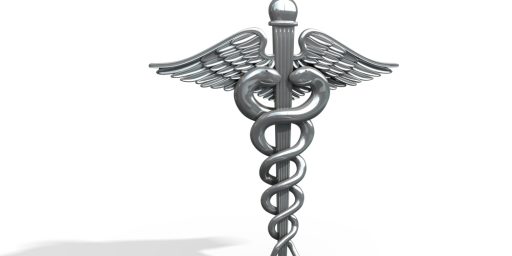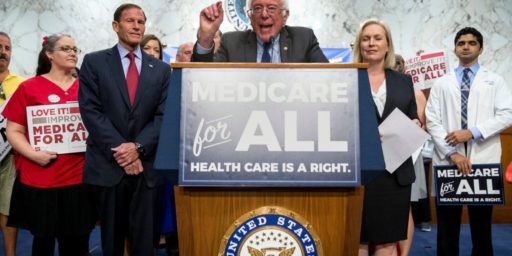Is Health Insurance Really Insurance? And Does it Matter?
Arnold Kling argues that what we call “health insurance” isn’t really insurance at all.
[Mark] Thoma says, “In general, insurance gives us financial protection from unexpected events — a tree falls on our house, we have a car accident, we become unemployed, we become sick and need health care, and so on.”
But what we call health insurance covers things like new eyeglasses, which is not a rare, catastrophic event. It seems to me that the big market failure in health insurance is that it exists to protect health care suppliers from having to bill patients directly rather than to protect consumers from catastrophic loss. That is, the failure is not in the way risks are managed by insurance companies, but in the very structure of what we call health insurance.
Ezra Klein tacitly agrees but says, basically, So what? “[I]f consumers, as they’ve repeatedly proven, don’t want insurance, but instead want insulation, why shouldn’t we seek to make that work (as it does in a variety of other countries and systems).”
They’re both right, of course. Health insurance, at least the comprehensive type rather than the more no frills HMO variety, isn’t really “insurance” at all but rather a combination of traditional insurance and an all-you-can-eat buffet. If that’s what most people want, then there’s no reason we can’t try to achieve it through our public policy mechanism.
Kling’s point is not irrelevant, however. It’s useful to understand exactly what it is we are talking about when making public policy arguments. Controlling the language of debate helps obfuscate that, which can be good from the standpoint of a given advocacy group but is bad from the standpoint of clarity.






You left off the most important part that results in a huge incentive problem. That most people percieve this “health insulation” as being paid by somebody else (the employer, government, etc.). The thing is that eventually somebody has to foot the bill for that all-you-can-eat buffet, and when you have hundreds of millions porking out at the buffet you are talking about one mother of a bill.
Further, the political process tends not to be the best way to allocate resources (see for example the Soviet Union and its former satellites, or even here in the U.S. with regards to the huge liabilities for Medicare).
I don’t disagree a bit with your assessment of health insurance. However, I do have a question. Let’s say, hypothetically, that all of the perverse incentives are magically removed from health care at the buyer side. Presumably, that would mean that buyers would decide to spend less (of their own money) on health care.
How do you think health care providers would respond to that?
By providing less health care.
Claiming that eyeglasses are what is making health insurance unaffordable is like saying that call waiting is what is making telephone service expensive, of that getting 5 email accounts instead of just 1 is making Internet service expensive.
What is the difference in cost between even 100 pairs of eyeglasses and the cost of a single open-heart surgery? It’s a selling point on the plan, they add inexpensive coverage to make the overall cost of the package look like a better deal. Take away the “all you can eat” salad-bar that comes as part of your steak dinner, and how much money do you save?
Geez, don’t tell me you think this is a valid criticism of Kling’s position?
Clearly Kling is talking about things like eyeglasses that would not be covered under what most consider as insurance. Basically, Kling is pointing out that if car insurance was like health insurance your oil changes and other, even expensive maintence would be part of your car insurance policy.
There are other things as well such as routine check-ups and pregnancy/birth. How about fertility treatments?
Insurance works off of low probability and expensive events. Mark Thoma’s example using a tree falling on one’s house is an excellent example. It is a rare event and it is generally expensive. Hence, it is possible to come up with an insurance policy that people might find reasonable. But having a home owners policy that covers light bulb changing, broken windows, and a clogged sink is another matter altogether.
What is the difference in cost between even 100 pairs of eyeglasses and the cost of a single open-heart surgery? It’s a selling point on the plan, they add inexpensive coverage to make the overall cost of the package look like a better deal.
But many people need eye glasses, while not everyone, or even most people need open heart surgery. Although I don’t think glasses are the real problem, but more that insurance has taken on what is the equivalent of auto insurance covering oil changes, tire rotations and spark plug changes. All of those services are relatively cheap compared to fixing a fixing the body from an accident, but everyone needs oil changes, tire rotations and new spark plugs-not eveyrone has an accident. I haven’t had a car accident in almost 20 years, my auto insurance likes me, but I have 2-3 oil changes and tire rotations a year.
Basically auto insurance would be unaffordable as well, if it covered all the little things.
The question in my mind is whether or not spending less on health care is a good thing, bad thing or indifferent thing.
Some would argue reducing spending on routine check ups and minor illnesses could lead to greater spending later when minor problems turn into bigger ones. Others argue that taking the kid in to see a doctor every time there’s a sniffle is a waste of scarce resources and drives up costs thus less people can afford to seek care.
What I see are no options. Basically we are stuck with traditional type insurance plans that are paid mostly by the employer and don’t encourage smart consumers. The experiment of HMO’s was rode out of town on a rail years ago even though it saved money and provided reasonable care.
We are stuck with a system that we must see the most highly trained technicians (doctors) for the most simple ailments. A move to health techs could free up resources and still provide good care. It always seemed funny to me you had to see a doctor to get an antibiotic when third world residents relied on pharmacists to get the same thing.
Medicine has become so complicated the doctors are like shamans who have unknown powers to heal. To question them is taboo. To speak ill of them brands one an ignorant heretic.
Options in health care, health insurance, and health providers could be the cure to controlling expenses and providing competition in field that lacks it.
We are stuck with a system that we must see the most highly trained technicians (doctors) for the most simple ailments.
I think this is also very true. I don’t know how many people I know who insist on taking their children to see an opthamologist for regular eye exams and glasses. An optomttrist is cheaper and can do the same job.
Just Me: A lot of people do that because their “insurance” covers opthamologists but not optometrists. A lot of people develop “eye allergies” once a year, too, because getting seen for that is covered (medical necessity) whereas getting an annual eye checkup (routine care) is not.
Kling’s repeating a canard – car insurance is, in fact, pretty similar to HMO/PPO health insurance (and, in fact, very dissimilar to the large deductible plans his ilk favor).
Consider the “co-pay” in an HMO/PPO as a small per-event deductible and it becomes evident that car insurance does, in fact, meet this model better – we don’t pay an ANNUAL deductible for car repairs like I have to on my HSA plan. If I get in three accidents and need three repairs, I have a deductible for each one, just like I used to on my HMO/PPO plan.
And as others have pointed out, most spending isn’t on the preventative stuff that you like to map to “oil changes”.
Disingenuous, all around.
M1EK:
Even if we exclude oil changes, car insurance doesn’t pay for blown transmissions, brakes, valve jobs, etc.
It just pays for generally rare events–crashes, thefts, fires, and the like. Medical insurance pays for even routine trips to the doctor and ordinary medications.
From one of the countries *with* health insurance: eye glasses are only covered if your eyes are so bad that you can hardly see without. And eye tests & check-ups are done by optricians in shops, so a lot less people go to the specialist.
It may be an ‘eat all you can’ buffet, but the customer doesn’t decide the menu – and your public spenditure is still higher (excel spreadsheet) than ours.
James,
True; but as has been pointed out numerous times, the regular visits to the doctor aren’t, in fact, responsible for most of the cost of health insurance (their cost is a drop in the bucket compared to heroic procedures, and that cost is further marginalized by copays and annual deductibles). The failure of people arguing the HSA (or whatever) case to be honest about where the money is really being spent makes it impossible to have a productive discussion.
M1EK: It depends on the plan. I’ve generally had pretty decent coverage and have, for the last nearly two decades, gone to the doctor exclusively for routine, non-heroic care. It’s true that most health care costs come at the end of life and for treating cancer, heart disease, and the like. But, for most of the life of the plan, the routine costs–checkups, allergies, pregnancies, pediatric care, etc.– are what’s being covered.
James,
I’ve worked in high-tech my entire career, and the plans I ‘enjoy’ have eroded the entire time from nominal copays to the point where unless I was seriously sick that year, the insurance company barely paid anything. (Ironically, the year before I finally got an HSA, I acquired an expensive chronic disease which, on the HSA’s first year, blew right threw that $4000 deductible like nobody’s business – on one single treatment – so I’ve been on both sides of this issue, clearly).
The last PPO/HMO-style plan I had had just raised copays for doctors’ visits to something like $35, annual deductible to something like $500, which meant that they basically covered nothing for a reasonably healthy single person. And I had to quit that job because of the benefits change, ironically, since I have a family, and we clearly weren’t very healthy – so there’s your economic friction right there – I left a job I liked, was good at, and was needed at, for a very stupid reason (a couple thousand bucks annually in medical costs).
I know your ideology prevents you from even considering the possibility, but join me: ten years ago I’d have sneered at the thought that socialized medicine might be better than this mess, too. HSA’s aren’t even close to being an answer – if you’re really sick, the deductible is just a speedbump; and otherwise it’s just another tax-advantage for the upper-middle-class.
Talk about disingenuous. This patently untrue.
I have pointed out that health insurance will cover things like pregnancy and birth and in some cases infertility treatments. These things are not rare, they are often not unexpected, hence they should not be covered by insurance. Oh, and they are expensive.
Let me see, and why could this be? Could it be what most consider insurance isn’t really insurance as Kling argues? Further there are very large subsidies for some of the biggest users of health care. So we see prices going up and up and up, and at the same time the plans start to erode and the wage protion of total compensation stagnates. So the solution is…more subsidies. Great idea! Of course, since this will be unsustainable the government will likely come up with non-monetary ways of curtailing the supply.
And I want a new flat screen HDTV as well.
Pregnancy = cheap compared to heroic interventions. Granted, some of the heroic interventions happen to the newborns that result from those very pregnancies, but most are for the very old. Infertility treatments? Please. If you can find an insurance company that covers that today, I’d like to see it.
Kling is wrong and so are you. Car insurance, with its per-event (not per-annum) deductibles matches HMO/PPO plans far more closely than it does the high-annual-deductible HSA-plans that he (maybe you, too) prefer. And for most people, again, the modern HMO/PPO plan simply doesn’t cover basic medical care most years due to higher annual deductible and co-pays (per-event deductible).
Oh, and that’s pretty darn offensive. This wasn’t a trivial move – we were faced with not treating serious illnesses or me having to quit a job I still miss. Far from a friggin’ TV. This “hey, folks, here’s the new plan, and here’s how much more it’s gonna cost you this year” manuever is all too common in the private sector these days – and it might well be causing more economic friction than simply switching to socialized medicine would.
Google is your friend.
Last time I checked Kling did not favor HSA plans and he is correct about what health insurance should be and what it is. And if you can find an auto insurance that covers things like my busted radiator, changing the timing belt and the shocks let me know. In short, you keep asserting this, but you can’t back it up by pointing to a single auto insurance plan that supports your thesis.
No sh*t, you do what you gotta do. Just like why I don’t have a flat screen HDTV and don’t do other things I want/like. Life is full of trade offs and the idea that you shouldn’t face some because they make you unhappy is pretty damned arrogant considering you want to take money from other people so you can be happy.
Yeah, well I see you ignored my link about non-monetary costs associated with socialized medicine. Typical.
By the way, the point about pregnancy is it shouldn’t even be covered at all. It is like saying that drivers in a demolition derby should get the same insurance rates as a good driver who hasn’t had accidents in years. You don’t insure things that are by and large voluntary.
Further, this adds additional pressure to health care because now we are subsidizing child bearing decisions, and the basic rule of thumb is when you subsidize something you get more of it. Now you have more kids also using up health care resources.
Gosh Steve, that must be why all the European countries with socialized health care have such high fertility rates…. NOT.
The advantage of insurer paying for fertility treatment is that the overall costs are less. People who have to pay for it themselves take more riscs and have more multiples. Multiples are quite expensive in health care terms, due to pregnancy complications, prenatal care and handicapped children.
By the way: the excel spreadsheet I linked to was an OECD graph comparing public/private costs of healthcare between OECD countries. Your government (= you taxpayers) pays more for you healthcare than my government pays for our socialized healthcare.
That’s a lie; and there’s no point continuing this discussion with you if you’re operating in this mode. I merely asserted that the per-incident versus per-annum deductible made car insurance more like a PPO plan than like an HSA-linked high-deductible plan.